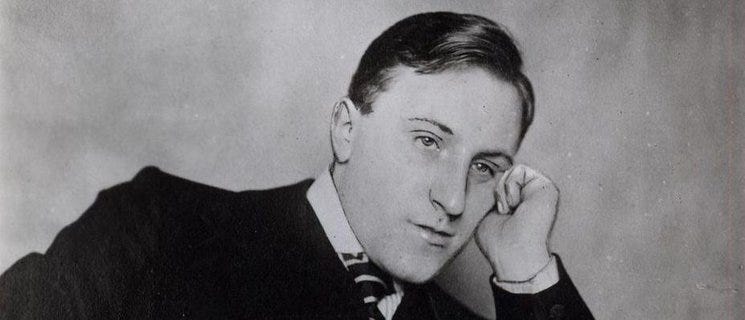

Discover more from Open Letters, from Anne Applebaum
Every couple of years, the town of Oldenburg in northern Germany - home to an excellent university and a charming city center - gives an award to someone who works in contemporary history and politics. The prize is named after Carl von Ossietzky, a German journalist who emerged from the First World War as a dedicated pacifist. Von Ossietzky was a fierce opponent of the cult of war and violence that then permeated Germany. His investigative journalism exposed Germany’s secret rearmament. He also wrote about the political roots of militarism, anticipating the rise of the Nazis. He condemned their cruelty and their lawlessness even before they took power.
As a result, he was arrested, imprisoned, and sent to a concentration camp not far from Oldenburg. The camp destroyed his health, leading to his early death in 1938. Just before that, in 1935, he received the Nobel Peace Prize , much to the consternation of the Nazi regime, who refused to allow him to collect it.
This year, the Oldenburg jury very kindly decided to grant the Carl von Ossietzky prize to me. Even in a small town, this was not entirely uncontroversial. A few days before the event, a colleague who lives in Oldenburg sent me a leaflet, circulated by local pacifists, arguing that I should not receive the prize because I support the idea of defending Ukraine from Russian invasion and terror, and especially because I have encouraged Germans to do so too.
That made me think about Von Ossietzky’s pacifism, and his opposition to militarism, and how those ideas should be interpreted and celebrated today. In the remarks I made (to a lovely, friendly, welcoming audience) I talked about the re-emergence of the cult of the military and of violence, not in Germany, but in Russia:
In Russia, we are witnessing the same celebration of combat today. Russian schools now train even small children to be soldiers. Russian television encourages Russians to hate Ukrainians, even to consider them subhuman, and to despise other Europeans as well. Russian leaders speak casually of using nuclear weapons against their neighbors, and regularly threaten to invade them. The Russian economy has been militarized: Some 40% of the national budget will now be spent on weapons. To obtain missiles and ammunition, Russia now does deals with Iran and North Korea, two of the most brutal countries on the planet.
As a result, combat and violence have been normalized in Russia. The war is now constantly portrayed as a permanent part of Russian life. The hundreds of thousands of dead and wounded are ignored and forgotten.
The truly brave pacifists, the one who are fighting the horrific return of bombs, destruction, terror and refugees to Europe, are also now in Russia too:
Like Carl von Ossietzky, my friend the Russian journalist Vladimir Kara-Murza made the brave decision in 2022 to remain in Russia and to criticize the war from there. Kara-Murza decided to do this, he said at the time, because he wanted the history books to record that someone opposed the war. Kara-Murza is already paying a very high price. His health is deteriorating, not least because several years ago he was twice poisoned by the Russian state. He is often kept in isolation. He has no hope of release: Recently, he received a new, 25 year sentence.
Nor is he alone. Since 2018, more than 116,000 Russians have faced criminal or administrative punishment for exercising free speech. Thousands of them have been punished specifically for objecting to the war in Ukraine. Their heroic battle is mostly carried out in silence. Because the regime has imposed total control on information in Russia, their voices cannot be heard.
Given the emergence of a militaristic regime in Russia, one that is determine to subjugate its neighbors, what are the lessons from the Second World War for Americans, for Europeans, and especially for Germans, today?
We must help Ukrainians defend themselves against this ugly, brutal and familiar cult of militarism. We must not let the Russians impose their increasingly totalitarian political system on them, to destroy their identity, to erase their civilization. At the same time, we must support brave Russians like Kara-Murza, Russians who want their country to be different, even if only by repeating and quoting their words in places like this.
I understand that for Germans, it is a new experience to be asked for help, to be called upon to defend neighboring countries against an aggressive, irrational military power. But this is the only morally acceptable choice for all of us: in Germany, in Europe, all across the democratic world. We must defend Ukraine, and we must hope that a military defeat will end this horrific cult of violence in Russia, just as military defeat eventually once brought an end to the cult of violence in Germany.
Since we happened to be meeting on the anniversary of D-Day, I reminded them that British and Canadian troops once helped to bring peace and the end of the Nazi regime in Oldenburg. And I really do hope that British, Canadian and German aid and support, as well as American and broader European support, will someday help bring peace and the end of a totalitarian occupation to Ukraine too.
In any case, I am really grateful to the jury, to the mayor, and to the city for the prize, not least because it made me think, once again, about what we really mean by “lessons of history.”





Congratulations Anne, that is a high honor indeed and from my perspective truly deserving. I believe that long after we are gone, those that follow will recognize the many voices that were raised in opposition to the Fascist plague. There aren't two sides to the conundrum we are facing, not if you want to be able to look in the mirror, to be on the side of truth and justice is the only position that a sane person can embrace. The sad fact is that the Fascist scourge is growing, when they capture the power of the state, the danger for all of us ramps up exponentially. Everything I read suggests that we are slow marching towards another World War, and just like the wars of the twentieth century were a whole other thing compared to the previous centuries, a World War in this century will make those of the past look like child's play. I'm a combat vet and I know about the horrors of the killing fields, we must do everything in our power to prevent them. There are good people everywhere, they need to be given as much voice and support as is humanly possible. Fascism could have been stopped in the 30's, but powerful people thought that they could contain and use it, it devoured them. There are people here in the US that are trying to do that today. I think they must be clueless about the demons they are unleashing. Living as you have been in Eastern Europe where the nightmare of the 30's and 40's is still evident, gives you a perspective that many here in the US lack, so thank you for the clarity you bring, we need to be clear-eyed about the future. 🙏🏻
Thank you Anne.